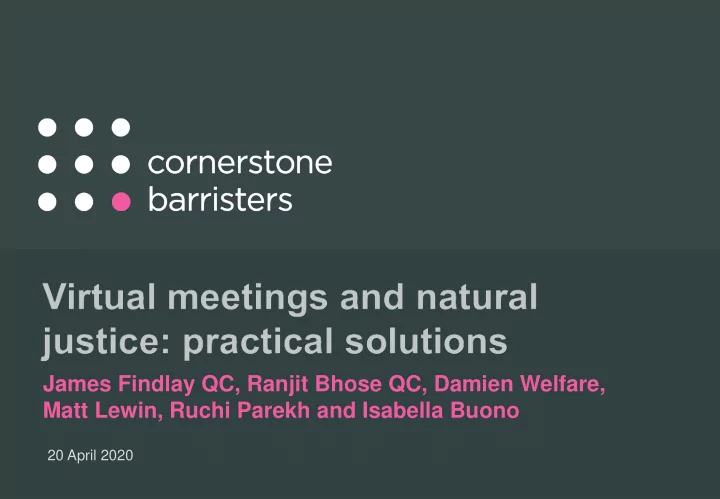

James Findlay QC, Ranjit Bhose QC, Damien Welfare, Matt Lewin, Ruchi Parekh and Isabella Buono 20 April 2020
Overview “Remote attendance” by councillors “Remote access” by members of the public Standing orders Last minute changes
“Remote attendance” by councillors
“Remote attendance” by councillors Conditions for remote attendance Reg. 5(2) A member in remote attendance attends the meeting at any time if all of the conditions in Reg. 5(3) are satisfied The member in remote attendance is able at that time – Reg. 5(3) * Where practicable Members By members Other members of the public of the public in in attendance entitled to attendance speak
“Remote attendance” by councillors Issues • Do the conditions for remote attendance apply to everyone throughout the meeting or only to the chair or another person (councillor/member of the public entitled to speak) who is called to address the meeting? General principles • There is no single model – choose the one that works best for your authority • Key message: strike a fair balance between openness and orderly conduct • Base remote working protocols on existing practice – as far as possible • Contingencies for IT problems and lack of expertise/accessibility • Protocols for attendance and voting
“Remote attendance” by councillors “Hear and be heard”: the principles • Analogy with use of microphones in in-person meetings • Requirement applies to the person who “has the floor” – they must be audible • Members of the public entitled to speak need to be heard while they address the meeting only “Hear and be heard” : in practice • Lost connections: member is deemed to have left the meeting until reconnected • Chair needs to manage the meeting to respond • No/inadequate internet – most platforms allow participants to dial in from a telephone
“Remote attendance” by councillors “See and be seen”: principles • Video should be used by members – unless they lack IT skills, equipment or adequate internet connection (“where practicable”) • Cannot compel members of the public entitled to speak to use video • Loss of video will (probably) not invalidate attendance “See and be seen” : in practice • Gallery view and speaker view – sufficient that members are capable of being seen throughout the meeting • Voting – show of hands, roll call or shared document
“Remote attendance” by councillors The Chair’s role • Ensuring attendance conditions are met – and making judgments on whether a member is in attendance (with advice from Clerk) • Monitoring quorum and entitlement to vote • Applying remote meeting protocols • Assisting public to understand the conduct of the meeting The Committee Clerk’s role • Assisting the chair – particularly with IT issues (“host” privileges) • Careful recording of which members are and are not in attendance in minutes
“Remote access” by members of the public
Public observation of the meeting • General position is that a local authority meeting shall be “open to the public”: s.100A(1) LGA 1972; regs 3 & 4 SI 2012/2089 • Subject to private session provisions to deal with confidential or exempt information • No change under SI 2020/392 which extends the definition of “open to the public” to include virtual meetings • Consider the use of telephone conferencing • Agendas, reports and background papers
Public participation in the meeting • Locally granted rights to participate – public questions, deputations, rights to speak on substantive matters • SI 2020/392 preserves such rights, subject to the reg 5(6) power to make new standing orders • How to respect these rights in the virtual world • What to do when technology (or people) go wrong • Excluding the public from parts of the meeting
Standing orders
Standing Orders: the Regulations Existing SOs incompatible with remote attendance deemed suspended DEFAULT No need to amend SOs in order POSITION to hold remote meetings (BUT) (Reg 5(5)) May make other SOs about remote attendance (Reg 5(6))
Standing Orders: Amendments What does your constitution say? MAKING/ AMENDING SOs If silent, you need Full Council resolution
Standing Orders: “ Emergency Powers ” “ To take any action necessary, including incurring expenditure, in the event of an emergency or disaster ” Sufficient Public law basis? principles
Last minute changes
Last minute changes: notice of meetings AND meeting Can rearrange BUT some may won’t be “open to meetings have legitimate the public” if no “without… expectation they’ll one is told about further notice” be notified it!
Last minute changes: reports for meetings OR making Publish complete UNLESS held at minor updates report on website shorter notice or that public and 5 days before new item on members can meeting agenda readily digest
A cautionary tale
Your questions • Would a Remote Meetings Protocol require an amendment to Standing Orders or does it supplement them? • What is the best way of excluding members who declare interests in an item or members of the public during closed session? • How do we deal with disruption in the meeting?
Your questions • How do we ensure fairness when making regulatory decisions (especially in licensing and planning)? • How do accommodate people who don’t have the IT skills to equipment to participate online? • Do the Regulations envisage (virtual) business as usual or should we only be dealing with urgent items?
For instructions and Ask us more questions: enquiries: events@cornerstonebarristers.com elliotl@cornerstonebarristers.com dang@cornerstonebarristers.com samc@cornerstonebarristers.com
Recommend
More recommend